 Petzlover
Petzlover Bicolor is originated from United States but Colorpoint Shorthair is originated from United Kingdom. Both Bicolor and Colorpoint Shorthair are having almost same weight. Both Bicolor and Colorpoint Shorthair has almost same life span. Both Bicolor and Colorpoint Shorthair has same litter size. Bicolor requires Moderate Maintenance. But Colorpoint Shorthair requires Low Maintenance
Bicolor is originated from United States but Colorpoint Shorthair is originated from United Kingdom. Both Bicolor and Colorpoint Shorthair are having almost same weight. Both Bicolor and Colorpoint Shorthair has almost same life span. Both Bicolor and Colorpoint Shorthair has same litter size. Bicolor requires Moderate Maintenance. But Colorpoint Shorthair requires Low Maintenance
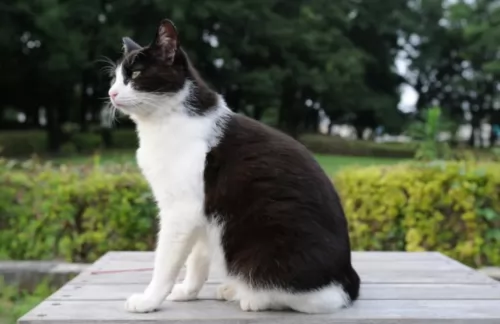 The first thing to know is that a Bicolor cat isn’t in fact a breed. Bicolor is just a term that describes a certain look that a cat has with its coat. It’s a cat with two colors such as red and white or black and white.
The first thing to know is that a Bicolor cat isn’t in fact a breed. Bicolor is just a term that describes a certain look that a cat has with its coat. It’s a cat with two colors such as red and white or black and white.
A popular name for bi-color cats is also Piebald or Tuxedo, and in fact many cat breeds can produce bicolor kittens, or black and white kittens such as Cornish Rex, Maine Coon, Manx, and others.
There are different coat color combinations when it comes to bicolor cats and the black and white markings may be more common but there are other color combinations too such as orange and white.
Nobody seems to know the origins of the Bicolor cats so we are going to assume they come from the USA.
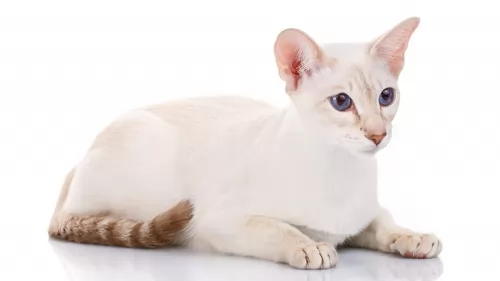 The Colorpoint Shorthair is a Siamese cat that came about when the Siamese cat was used with the red American Shorthair to bring about new colors.
The Colorpoint Shorthair is a Siamese cat that came about when the Siamese cat was used with the red American Shorthair to bring about new colors.
The actual name is given by the CFA or Cat Fanciers’ Association to refer to pointed cats that have Siamese parents and that have many colors other than the usual 4 Siamese colors which are blue, lilac, seal, and chocolate.
It was in the 1940s and 1950s that cat breeders in the UK and the USA wanted to develop a Siamese cat with red points as opposed to the traditional Siamese colors. It was in 1964 that these red and cream Colorpoint Shorthairs were awarded championship status with the Cat Fanciers’ Association.
Today, different cat registries recognize the Colorpoint Shorthair as a separate breed while others see it as a variation of the Siamese.
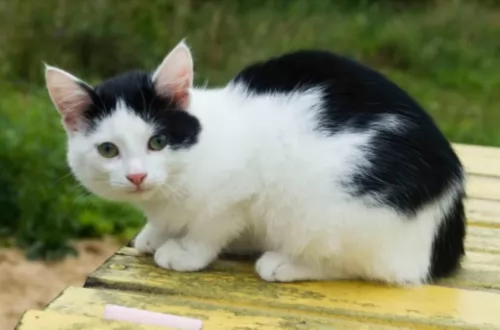 Regardless of the breed they belong to, information on these cats suggests that they can have many different looks. Look at the amazing Turkish Van cat for instance – each of these cats is recognizable for its long, luxurious fur. You’ll find a few touches of color on the cat's ears and tail, making in a Bicolor. They also have an interesting characteristic – being fond of water!
Regardless of the breed they belong to, information on these cats suggests that they can have many different looks. Look at the amazing Turkish Van cat for instance – each of these cats is recognizable for its long, luxurious fur. You’ll find a few touches of color on the cat's ears and tail, making in a Bicolor. They also have an interesting characteristic – being fond of water!
These Bicolor cats weigh in the region of 3 – 7kg, and can tend towards the smaller or larger size. Some of them can have short or long hair, larger or smaller ears and green or yellow eyes.
Coming from different cat breeds, the bicolor cat can have a mix of wonderful characteristics – they can be vocal or quiet or confident or shy.
They’re always wonderful though and can be curious, intelligent, playful, loving and loyal. They make great companions who just love the interaction they have with their human owners.
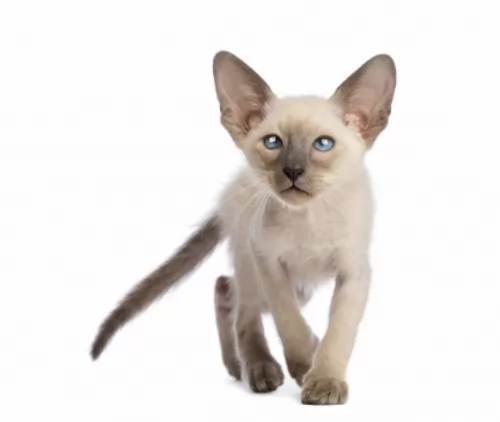 The Colorpoint Shorthair is a medium-size cat that typically weighs between 2 to 4kg and is nicely muscled. This is a long cat with legs that are long and slender too.
The Colorpoint Shorthair is a medium-size cat that typically weighs between 2 to 4kg and is nicely muscled. This is a long cat with legs that are long and slender too.
The coat is short and glossy, light-colored with darker extremities. Colors can be Cream Point, Red Point, Cinnamon Point, Seal Point, Blue-, Lilic- and Chocolate Point among others. The cat is well known for its mesmerizing almond-shaped blue eyes.
This sweet agile, athletic cat will be a delight in your home as he is highly intelligent and can easily learn a few basic commands but he is also friendly, playful, and loving. They’re social, outgoing cats too and when he’s not amusing himself, he will happily come and lounge about close to where his beloved human companions are.
On the other side of the coin, these cats can also be somewhat nervous and sensitive and they won’t adapt easily to a change in environment and lifestyle. It is why you have to choose your pet carefully and understand that owning a pet is a commitment of some 15 years or so.
Like the Siamese cat, these felines can be very vocal and they let you know when they want your attention.
 The Bicolor cat is such a steady, reliable cat-friend to have. When you start looking as these cats as your companion, you're going to get a smart, funny, adoring, playful family member who will be there for you whether you go to work each day or stay at home.
The Bicolor cat is such a steady, reliable cat-friend to have. When you start looking as these cats as your companion, you're going to get a smart, funny, adoring, playful family member who will be there for you whether you go to work each day or stay at home.
They’re such easygoing cats, with no airs and graces. They’re happy, relaxed, and uncomplicated cats and when you make a Bicolor your pet and friend, your life just becomes that much more meaningful.
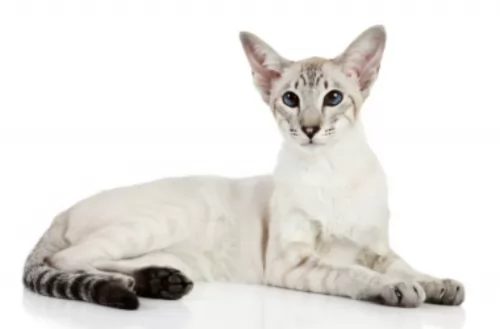 Choose the wonderful Colorpoint if you want a cat that isn’t cold and independent. With this cat you have one that is more like a companion and looks forward to being around you.
Choose the wonderful Colorpoint if you want a cat that isn’t cold and independent. With this cat you have one that is more like a companion and looks forward to being around you.
This is a loyal and loving cat who wants to be part of the human family and he wants to be involved in your life.
He suits first-time cat owners, those with children and pets in the home as well as being an excellent pet for seniors – anyone in fact, who is willing to bestow on him the love and affection he craves.
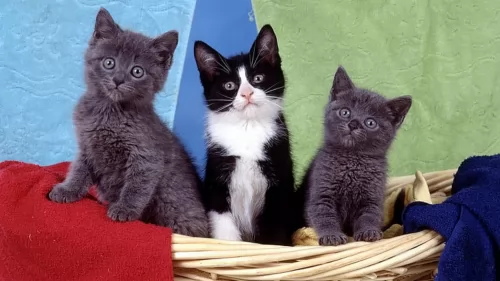 By providing your kitty cat with a loving home, you can ensure that he stays as healthy as possible. Unfortunately though, cats can get sick, regardless of how well you take care of them and then as a responsible pet owner, you will be able to take your pet to your local vet.
By providing your kitty cat with a loving home, you can ensure that he stays as healthy as possible. Unfortunately though, cats can get sick, regardless of how well you take care of them and then as a responsible pet owner, you will be able to take your pet to your local vet.
Some of the common cat problems you get can be kidney disease, ear infections, dental disease, parasites such as heartworm, cancer or something like feline immunodeficiency virus.
Whether your cat has a virus or an infection, remember that getting your cat to the vet can mean nipping the problem in the bud before it gets more serious.
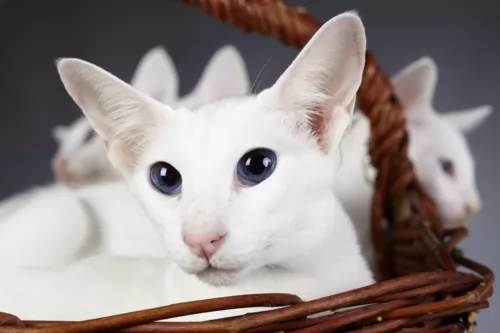 When it comes to the health of these beautiful cats, you may well find similar health issues as what affects the Siamese, some of which are asthma or bronchial disease, congenital heart defects and lymphoma among others.
When it comes to the health of these beautiful cats, you may well find similar health issues as what affects the Siamese, some of which are asthma or bronchial disease, congenital heart defects and lymphoma among others.
Lymphoma is cancer in the lymphocyte cells. Your cat will be lethargic and you will need to get him to the vet and provide the vet with a medical history of your cat. Lymphoma is believed to be associated with exposure to feline leukemia virus as well as the feline immunodeficiency virus.
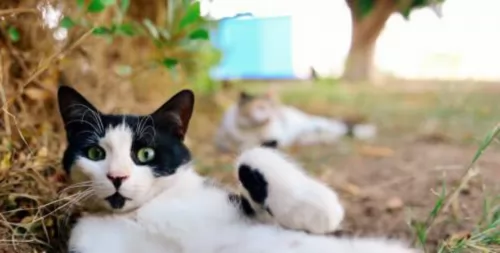 Caring for your Bicolor cat is much the same as with any other cat. Your Bicolor will shed, so brushing him will tickle him pink, especially if you do it lovingly and gently – it’s like a bonding session. The weekly brushing will get rid of loose hairs and dust and keep the coat healthy and shiny.
Caring for your Bicolor cat is much the same as with any other cat. Your Bicolor will shed, so brushing him will tickle him pink, especially if you do it lovingly and gently – it’s like a bonding session. The weekly brushing will get rid of loose hairs and dust and keep the coat healthy and shiny.
Spay or neuter your pet to avoid unwanted kittens. Stay up to date on veterinary visits and vaccinations.
Provide your cat with stimulating toys as well as all the equipment he needs to be comfortable – food and water bowls, litter box, grooming equipment, bedding, climbing- and scratching equipment.
All cat owners, whether their cats eat homemade food or wet- or dry food should read cat food labels and understand the nutrients content.
Certainly, as a carnivore, cats require certain vitamins, minerals, and proteins that only meat can provide.
Understand how to work out if the cat food is balanced or not and not packed with too many grains and carbohydrates.
How much your Bicolor eats will depend on his age and his activity levels. Be careful not to overfeed your cat as overfeeding is dangerous. When cats put on too much weight, it leads to problems such as diabetes, heart- and joint disease.
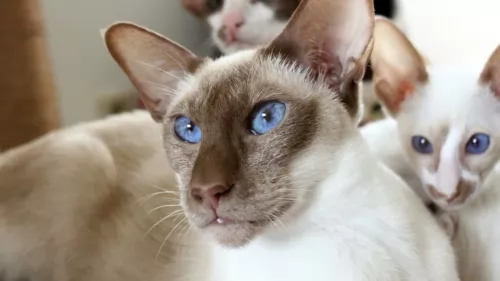 Rember that your Colorpoint Shorthair is a long, lean, musculac cat and for health purposes, you want to ensure a good diet of the best cat food there is. There are some excellent commercially manufactured cat goods available and it is wise to get to know the ingredients as meat and protein is high on the list. Cats are carnivoes and it is imperative to feed your cat high quality protein. When in any kind of doubt, speak to your vet about the best cat food available for your special feline friend.
Rember that your Colorpoint Shorthair is a long, lean, musculac cat and for health purposes, you want to ensure a good diet of the best cat food there is. There are some excellent commercially manufactured cat goods available and it is wise to get to know the ingredients as meat and protein is high on the list. Cats are carnivoes and it is imperative to feed your cat high quality protein. When in any kind of doubt, speak to your vet about the best cat food available for your special feline friend.
The short coat requires brushing once a week.
Check your cat over for any unusual lumps. Look at his eyes, check inside his ears for signs of redness and infection and check inside his mouth for signs of bad teeth as this can cause him terrible pain.
Provide a litter box and keep it scrupulously clean.
Have your cat spayed or neutered to avoid unwanted kittens and to also promote better health for your cat.
Provide your cat with a warm bed, food and water bowls, and stimulating toys.